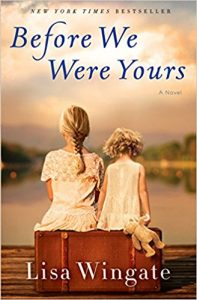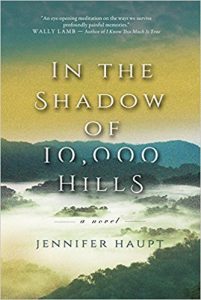BAD HISTORY CAN MAKE GOOD FICTION
Inspiration for good novels can come from anywhere. Sometimes stories  spring from experiences in the author’s life. Other times they explore experiences the author never had but wonders about. Recently I read two very good novels that were heavily influenced by horrific events of the recent past, and they started my thinking about how authors can use such events to give life to engrossing characters and spellbinding stories.
spring from experiences in the author’s life. Other times they explore experiences the author never had but wonders about. Recently I read two very good novels that were heavily influenced by horrific events of the recent past, and they started my thinking about how authors can use such events to give life to engrossing characters and spellbinding stories.
The first novel, Before We Were Yours, draws on the history of the Tennessee Children’s Home Society, run by Georgia Tann in Memphis during the first half of the twentieth century. The Society was well respected until the 1940s when authorities discovered that Tann had destroyed most of the adoption papers to cover up how many children were taken illegally from their parents to be offered to film stars and other wealthy clients for exorbitant adoption fees.
To tell the story, author Lisa Wingate creates the Foss family, who live in a shanty boat on the Mississippi in 1939. While the father takes the mother to the hospital to give birth to twins, police officers take the children off the boat and place them with the TCHS, where they suffer from malnutrition and abuse, except on “party days,” when they are fed, cleaned, and dressed up to be presented to prospective adoptive parents.
In a parallel story, Wingate tells of Avery Stafford, a successful lawyer and daughter of a senator in present-day Aiken, S.C. At a nursing home for a political event, Avery meets an elderly woman who steals Avery’s bracelet and claims it is hers. Through the bracelet, Avery discovers a mysterious connection between her grandmother, who has dementia, and the woman at the nursing home. Later, a lawyer shows Avery some of her grandmother’s confidential papers, including a birth certificate for a boy named Shad Foss.
Wingate makes the story come alive through Rill, the eldest Foss daughter, who narrates her family’s travails at the hands of Georgia Tann and her effect on their lives beyond. As a 12-year-old, she’s smart, brave, and compassionate.
 The second novel, In the Shadow of 10,000 Hills, involves the genocide that killed 800,000 people in Rwanda in 1994. Lillian Carlson, disillusioned by the assassination of Dr. Martin Luther King, Jr. in 1968, leaves Atlanta and moves to Rwanda, where she starts an orphanage. Years later, her lover in Atlanta, Henry Shepherd, abandons his wife and young daughter to follow Lillian to Rwanda. In 2000, his daughter, Rachel, now an adult, goes to Rwanda in search of her father and finds a community, including Lillian, who are no longer under siege but mourning great loss and injury.
The second novel, In the Shadow of 10,000 Hills, involves the genocide that killed 800,000 people in Rwanda in 1994. Lillian Carlson, disillusioned by the assassination of Dr. Martin Luther King, Jr. in 1968, leaves Atlanta and moves to Rwanda, where she starts an orphanage. Years later, her lover in Atlanta, Henry Shepherd, abandons his wife and young daughter to follow Lillian to Rwanda. In 2000, his daughter, Rachel, now an adult, goes to Rwanda in search of her father and finds a community, including Lillian, who are no longer under siege but mourning great loss and injury.
The author of 10,000 Hills, Jennifer Haupt, went to Rwanda as a journalist in 2006, so she knows firsthand the misery and courage that inform her story. Although her characters are fictional, they embody the ongoing grief of the genocide survivors or the need to understand of those, like Rachel, who didn’t realize they were affected. Rachel is mourning a loss of her own, but she doesn’t grasp the universality or the true functions of grief until she goes to Rwanda. Haupt does an excellent job showing how life changes but continues following great sorrow. Lillian has found her source of strength and joy in the orphanage, but Rachel has to seek out the source within herself that enables her to give meaning to her life. Her journey is challenging and compelling.
In both of these novels, the authors speak with an authority that makes the events and characters ring true. I learned a great deal about two historic events that I knew little about. I had never heard of the Tennessee Children’s Home Society and was familiar with only the basic facts of the Rwandan genocide. Knowledge is important because only by knowing the horrors of history can we hope not to repeat them. Yet the authors were able to find within these tragedies stories of hope and love. The stark contrast between the darkness of the events and the brightness of the characters gives these novels a deep beauty. Good fiction is about people, and people show their true selves best when they are tested.
Sally Whitney
Sally Whitney is the author of When Enemies Offend Thee and Surface and Shadow, available now from Pen-L Publishing, Amazon.com, and Barnesandnoble.com. When Enemies Offend Thee follows a sexual-assault victim who vows to get even on her own when her lack of evidence prevents police from charging the man who attacked her. Surface and Shadow is the story of a woman who risks her marriage and her husband’s career to find out what really happened in a wealthy man’s suspicious death.
Sally’s short stories have appeared in magazines and anthologies, including Best Short Stories from The Saturday Evening Post Great American Fiction Contest 2017, Main Street Rag, Kansas City Voices, Uncertain Promise, Voices from the Porch, New Lines from the Old Line State: An Anthology of Maryland Writers and Grow Old Along With Me—The Best Is Yet to Be, among others. The audio version of Grow Old Along With Me was a Grammy Award finalist in the Spoken Word or Nonmusical Album category. Sally’s stories have also been recognized as a finalist in The Ledge Fiction Competition and semi-finalists in the Syndicated Fiction Project and the Salem College National Literary Awards competition.
- Web |
- More Posts(67)